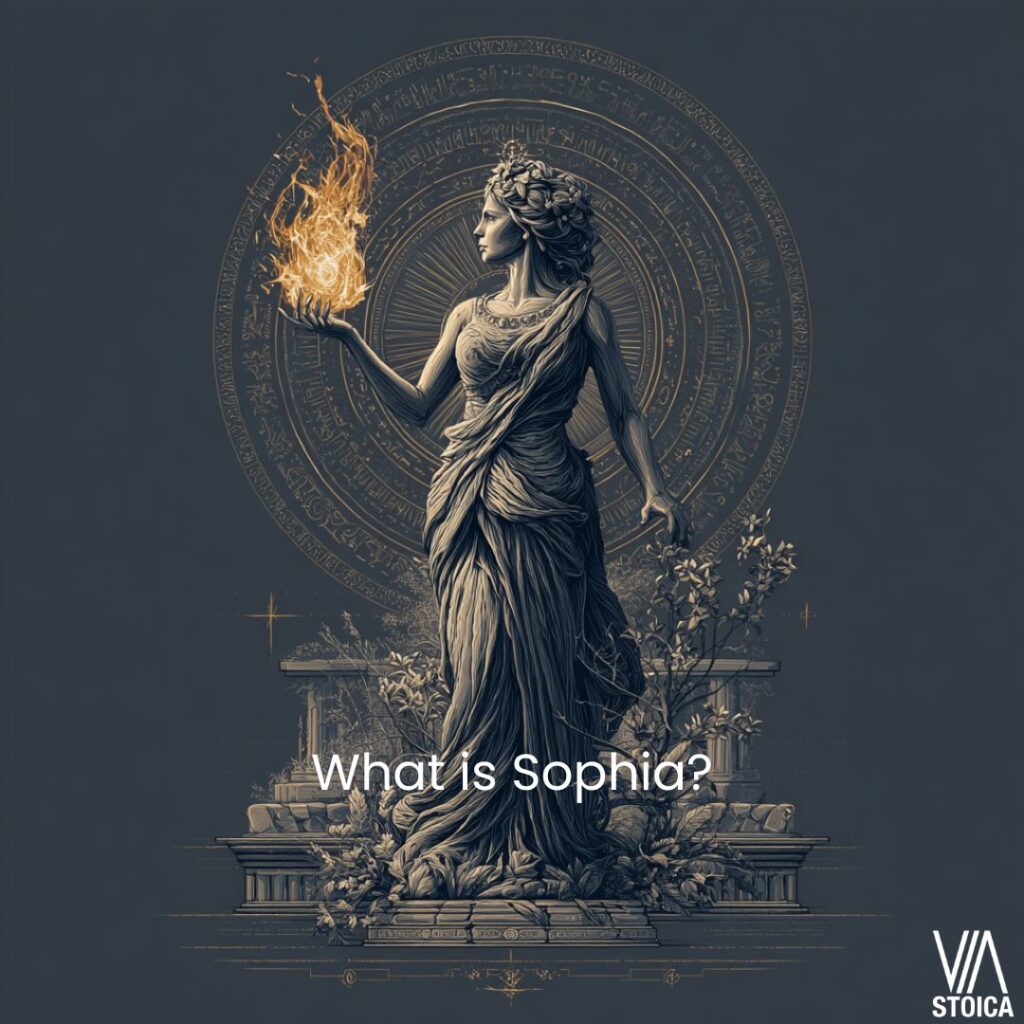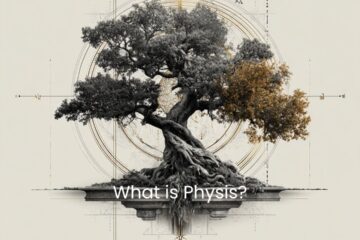
What Is Sophia?
Sophia in Stoicism is the virtue of wisdom, the deep understanding of what is truly good, bad, and neither. It is the highest intellectual virtue in the Stoic tradition, guiding right judgment and right action.
Sophia is central because it shapes how you interpret the world, how you choose your priorities, and how you respond to life’s challenges. In a world filled with noise, confusion, and emotional reactivity, Sophia in Stoicism offers the path to virtue and Eudaimonia.
Breaking Down the Word
Sophia (σοφία) comes from ancient Greek and carries rich philosophical meaning:
- σοφία — “wisdom,” “skill,” or “knowledge gained through understanding.”
- Connected to sophos (σοφός) — “wise, skilled, clear-minded.”
- Contrasts with mere technical skill; it refers to moral and philosophical wisdom.
Sophia sits at the core of Stoic ethics: to live well, one must first see the world correctly. The Stoics believed that a wise person doesn’t just accumulate information. They align their judgments with nature, reason, and virtue. This clear perception becomes the foundation for right living.
Key Dimensions of Sophia
- Wisdom about what matters.
Sophia helps you distinguish between what is up to you and what is not, allowing you to focus your actions and judgments on what is true and rational. - Understanding the nature of virtue.
For the Stoics, Sophia is inseparable from arete (virtue). A wise mind naturally moves toward what is upright and away from what is irrational. - Correct judgment and action.
Sophia enables you to interpret impressions properly, which connects directly to the Discipline of Assent and to the practical virtue of phronesis (φρόνησις), practical wisdom. - Harmony with nature (physis).
Sophia aligns the mind with the rational order of the universe, the Logos, creating inner steadiness and outer clarity.
Core Stoic Principles Connected to Sophia
- Logos (λόγος) — The rational structure of the world that Sophia allows us to recognize and live in harmony with.
- Arete (ἀρετή) — Virtue — The Stoics held that virtue is one, but Sophia is its intellectual foundation, guiding it.
- Phronesis (φρόνησις) — Practical wisdom — Whereas Sophia is deep understanding, phronesis applies that understanding in daily life.
- Prohairesis (προαίρεσις) — Moral choice — Epictetus’ central concept: the faculty of choosing in line with reason. Sophia strengthens prohairesis by clarifying what truly matters.
Modern Misunderstandings
Sophia is often mistaken for intelligence, talent, or having lots of information.
But the Stoics were clear: you can be intellectually brilliant and still unwise.
Sophia is not:
- quick problem-solving
- intuition or instinct
- academic knowledge
- emotional detachment
- mystical enlightenment
Sophia is a moral skill, the ability to see the world truthfully and live accordingly. It is about clarity of judgment, not cleverness.
In modern life, people chase productivity hacks, shortcuts, or information overload. The Stoics remind us that wisdom is not about knowing more, but about knowing what truly matters.
Why Sophia Is Central to Stoicism
Sophia is central because it shapes how you judge everything that happens in your life. When your understanding is clear, your choices become steady and your reactions become grounded. Wisdom in Stoicism is not an abstract ideal but a way of seeing the world that aligns your judgments with reason and virtue.
When Sophia guides your perception, qualities like resilience, peace of mind, clarity, and courage arise naturally. It is the virtue that allows all other parts of Stoic practice to take root.
Practical Applications of Sophia
- Journaling for clarity.
Each morning ask: “What is truly in my control today?” Learn more on: How to Practice Stoicism. - Pause before assent.
When an impression arrives, delay your judgment and examine it, a key practice described on the Discipline of Assent page. - Sort your values.
Make a list: What is good, bad, indifferent? Revisit it weekly to strengthen your moral perspective. - Seek the wise voice.
Before acting, ask: “What would the wiser version of me choose here?”
FAQ
What does Sophia mean in Stoicism?
Sophia means the Stoic virtue of wisdom, understanding what is truly good and acting in accordance with reason.
How is Sophia different from Phronesis in Stoicism?
Sophia is deep philosophical wisdom; phronesis is the practical application of that wisdom in daily choices.
Why is Sophia important in Stoic practice?
Because right living depends on right judgment, and Sophia is the virtue that aligns judgment with nature and reason.
Conclusion
Sophia reminds us that a good life begins with clear seeing. When you understand what truly matters, your decisions become lighter, your actions more intentional, and your inner life more stable. Wisdom is not a distant ideal but a daily practice, a way of training the mind to stay aligned with reason, virtue, and nature. Cultivating Sophia strengthens every part of Stoic living, from emotional resilience to moral clarity.
Want to explore more Stoic practices?
Book a free consultation with one of our Stoic Coaches or learn about more Stoic philosophy terms. You can also listen to the Via Stoica podcast on Spotify or Apple Podcasts or watch it on YouTube.
Author Bio
Benny Voncken is the co-founder of Via Stoica, where he helps people apply Stoic philosophy to modern life. He is a Stoic coach, writer, and podcast host of The Via Stoica Podcast. With almost a decade of teaching experience and daily Stoic practice, Benny creates resources, workshops, and reflections that make ancient wisdom practical today.



0 Comments